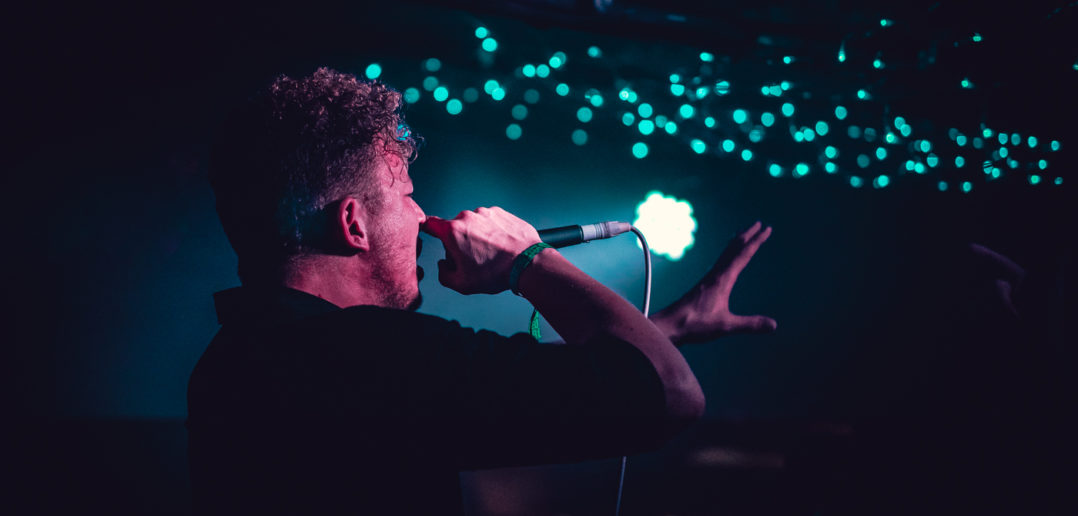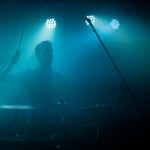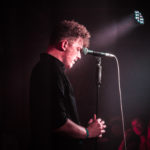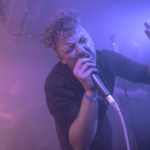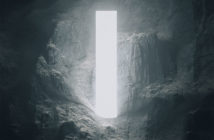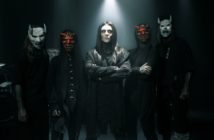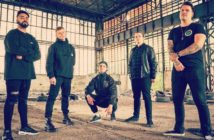COLD NIGHT FOR ALLIGATORS is a Prog Metal Band from Denmark. I met them at Euroblast Prog Metal Festival in Cologne some months back, only a few hours before they shreddred the stage down in the basement of the venue. Johan, their vocalist and Nik, their drummer, took moment off (from preparing for their show) to speak with me about their recent album ‘Course of Events’, festival atmosphere and to give some deeper insights into their band dynamics.
The Bogren Experience
„Your recent album „Course of Events’ was produced in cooperation with Jens Bogren. How did you like working with such a big fish?“
“It was a good experience”, they say pointing out the professional attitude of Jens Bogren, who mastered the album and Ricardo Rodrigues, who mixed it. “We’re more a budget band compared to whom they’re working with”, as they put it. Previous work with others had not been as positive. Johan and Nik describe enthusiastically with how much care for details this team worked on their material, all the effort they put in, and how more than happy they are with the professional attitude they experienced with Ricardo and Jens.
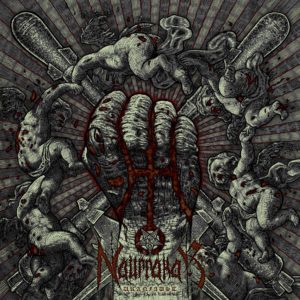
It is quite a piece of work for bands to get their audience and sell their music. I wonder how happy Johan and Nik are with the perception of their recent album and their shows?
“I am very happy with all we achieved”, Johan begins and mentions the festivals they played lately. There is a keen competition about gigs and festival slots, they point out. „Hopefully the next record will take us further”, Johan says and adds: “Personally, I’d love to do more touring in the future.”
Me, I found the Euroblast Prog Metal Festival very relaxed and comforting. There was a welcome number of opportunities for the crowd to get in touch with the musicians. Sort of a market square in the yard was rather busy due to the warm weather, and despite the really tight schedule everything ran absolutely smooth. The crowd was of a comforting number and of an easy-going attitude. How did Nik and Johan sense the atmosphere?
“These kinds of festivals we’re playing on, are – let’s say – nerdy festivals. It’s proggy and it’s just people that are really enjoying music and are really, really into it. 150 %!” says Johan. “All the bands playing here are music nerds as well”, he explains before pointing out once more that it all is about the music. Nik agrees: “Everyone is really, really, really friendly.”
“Having A Band Is A Business”
Leaving the shores of the big outside world, we finally dive into the depths of COLD NIGHT FOR ALLIGATORS. Speaking of writing music, I wonder what is their priority: the creative part or playing live?
“Creative”, comes automatically and „I just want to write songs!“ They describe that coming up with a new album is a time of repeatedly playing the new material over and again. For months up to one year or even longer. And then they want to go out, finally. Obviously they love hanging out and jamming with the others but add: “Having a band is a business. And we love it. Not complaining. We’re doing all this business and then we can go back and be creative again.”
I stick with the thought of all the work that comes along with having a band. Each band works differently. And beyond playing the instruments, singing and writing music, there are the supportive tasks to do: marketing, management, etc. And then there is the hidden core that makes it unique; the contribution of each personality as such to the entity, the dynamics.
“Kristoffer our guitarist”, Johan begins, “may not be the mastermind but he keeps us all together. We have a long list of jobs and who does what and who is secondary …” His voice fades. Nik suggests: “Call him the guy who has the overview.”
Then Nik takes a second and decides that it was his turn to say what he contributes. „What is my strong side?“ But even with a second attempt he can’t word it.
So Johan takes over: “I am probably the complainer.” He seems not entirely happy with it, so we discuss the importance of the complainer to push forward a band’s evolution. “If you’re happy with where you are you’re probably not progressing”, he sums it up.
Once more, Nik struggles with wording his strong side. “I don’t know. Maybe trying to push creativity? I don’t know. What the f* is my strong side?” Johan suggests: “Maybe you are sort of a complainer, too?” They discuss and explain that he has a different focus, for example on the visuals, such as the videos and often presses for more creativity here.
Although Kristoffer has the main part in writing, as Johan says, Roar, the other guitarist gets his “credit for the most creative output in terms of writing.” He specifies his statement that for the previous album Roar came with some pretty much finished songs that required only few more rearrangements.
Getting Out of Nik’s Living-Room
Very apparently the creative processes in the band are based on close collaboration. So do they classically jam the songs together mostly?
Johan is indecisive. “Maybe not. Or only the vocals?” Nik explains that each time he writes a song at home he will soon come to a point at which the emotions transferred by the song don’t work anymore and he is only able to get them out with the others around: “You can’t get it out really in your living-room. Just making melodies is really cool there but then have to get it all together.”
Johan tells me that “jamming everything from the scratch was a bit over-productive” earlier. So they began to chip in songs that already had (most of) the basic structure and once each had learned to play those they finalized the songs together from there on. He summarizes it as nice mix of getting homework done and being cooperative.
Naturally that leads to the question what keeps the band together?
It’s about the music, of course, but Johan goes on: “All of us are not afraid of moving into different directions and let each other, you know … I don’t know! You better explain that”, looking to Nik who points out that “prog is not the program” but the result in terms of their style. Friendship is a key element as well, naturally and again more the result than the spark: “You get close when you have a common project that is sort of just not fun all the time. It’s rewarding that we kind of have to struggle together and have to put in a lot of hard hours of working for whatever it is you need to do as a band.”
“So achieving something together forms a team?”
“It’s also about trust”, says Nik, “to rely on each doing his best.” He emphisizes that to him these dynamics are essential even to a point that has a priority over success. “There needs to be trust and mutual appreciation for the effort we put in!”
Nik’s Style: “Impatient. Curious. Indirect.”
Speaking with Nik anyway opens the door to shift the focus on him as a drummer. Drummers are used to play an instrument that requires quite a moment to set it up and this set-up is a critical process. A guitarist opens his case, takes his instrument, plagues it in and perhaps checks if it needs some tuning. Ready to play in, let’s say, two minutes. In those two minutes, a drummer will roughly have begun to set up his kit. And what would that be in Nik’s case? What’s the core and the ‘must-be-exactly-like-this’ in his kit?
“I’d say, the core of the drum kit is obviously the double pedal, the snare drum and the drum stool. And as much as you are working on playing a bit faster stuff you realize that the whole core, that your posture is so critical.” The precise position of his pedals, the angle of his snares and relative position of both to the stool – he describes that in detail. Just when I get the notion that he might be a bit too much of a perfectionist in that he reveals the critical detail. It’s about body physics and efficiency. Both add to performance and speed when taken care of carefully: “so the perfect momentum works” and preventing him from stabbing the snares, as he puts it. He tells me that he had “sort of a shooting crisis” working at the last album so he had to train hard to play more consistently and hit harder. Obviously happy with the result he gets a bit more relaxed ending in: “I don’t care where the rest is as long as I can reach it and I have sort of long arms.”
“I Learned A Bit From That One”
Shifting the focus to Johan, I would like to know which lyrics have been the hardest for him to write?
“‘Black Swan‘, on our latest CD”, he says without any hesitation. “The whole concept of the album was writing songs on the band members not only me or the world.” He intended to have a story of each of them. ‘Black Swan’ is about his grandfather dying from dementia and how to get over it. “First time, I heard it after I recorded it I broke down in tears. I have never done that before” he says laughing a bit. Speaking of this moment still moves him and his laughing is a natural reaction on the mixed emotions resulting from this very setting here and now. Excited because sitting in an interview only few hours before their important festival gig and then speaking of such hard memories. He points out that not writing but listening the song turned out to be the really tough nut. But then it is part of the processing and thus, “it was a relief”, Johan says to add after a short break: “I learned a bit from that one!”
„I read you are focussing on the dark sides of life in your lyrics. Is that as you process positive experience outside of your music?“
“It’s not totally true, not only about dark sides of life”, Johan begins, pointing out that he might be a bad lyricist as he just cannot paint it all in black. He might focus on dark or scary topics but “I am also trying to be positive in a way.” ‘Black Swan’ ends on that everything is gonna be ok, for example.
“Sure. Isn’t that the ultimate motivation to proceed at all? Everything’s gonna be alright.”
“Yes, of course. I can’t write lyrics like everything’s gonna fall apart, and everything’s gonna be shit. That’s not possible for me.” He explains that he needs to be authentic and his attitude is to fight things through to the end. Nik emphesizes that there is so much effort for a band and so much they have to fight for. He could not play in an all-over-negative lyrics band. “But can I stand behind it? Is it inspiring?”, speaking of the message their songs transfer. And he has to cope with it. “I could never play in a Black Metal band.”
Fun To Hit The Drums Hard
“One final question”, I say. „And it is be one of my favourite. What is metal to you?”
Silence. It takes them by surprise.
For Johan, metal began with a Papa Roach concert when he was 12. “Just looking at people’s faces. Just moving around. People being all crazy, just moshing, just being happy, sweaty but helping each other up, friendly! That was an amazing experience.” So metal to him is, as he continues explaining, about passionate people and as he is lacking a word he looks to Nik once more. “Stand up?”, Nik suggests. “Yes, stand out or express themselves, I think. I think that’s metal to me.” Their ping-pong teamwork is really good.
Nik agrees that is “a lot about community” and passion and being allowed to be authentic. In this regard it is about freedom, too. Whether the lyrics are personal or about horrible stuff in the end there is fun and “a way to explore aggression and dark imagery. But there is also so much creativity.” He says: “I feel all these emotions in a very positive way.” He takes a second: “And it is fun to play fast and hit the drums hard!”
What is metal to me? The course of events in 2019 has shifted my personal priorities. Metal has even more become a sphere outside the real world. It’s place to forget about hardships, just be as you are and to explore all these endless sub-spheres each of which actually is universe. Other just call them ‘a band’. I love exploring those tiny universes, learning how the gear wheels work to make it a whole.
The Euroblast Prog Metal Festival has proven to be an inspirational universe on more than one regard! Thank you, Alligators for taking your time on the venue and your openness but most of all for your patience!
Photos: A big thanks to Quinten Quist! Check out his work on Instagram!

